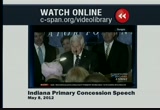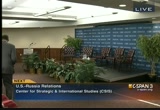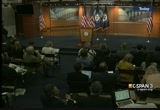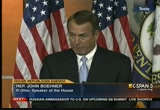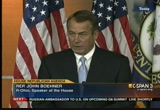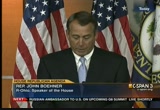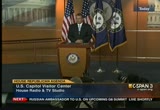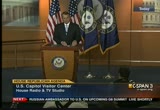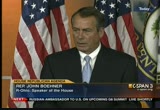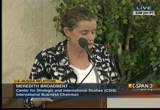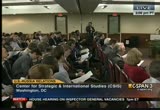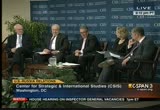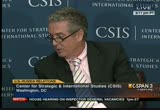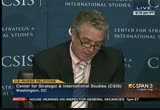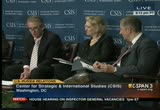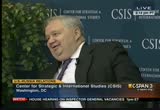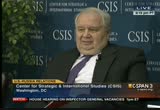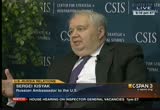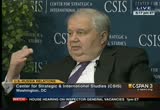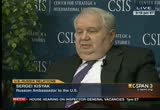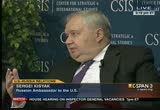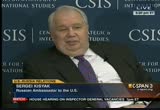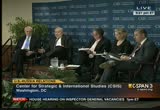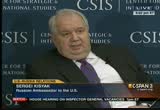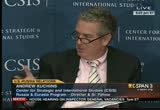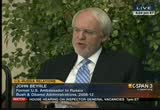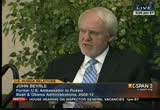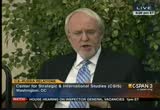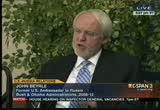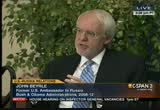tv [untitled] May 10, 2012 5:00pm-5:30pm EDT
5:00 pm
america. the news media and political leaders spend a great deal of time talking about what is broken in our country. and to some degree that is the nature of their business. but we should also have confidence that the unique american experiment is alive and well, and our political system still can work. >> tuesday night, long-time indiana republican center lost to richard mourdock. look back at his term career on the senate floor and in hearings, including his work in the '90s with snar sam nunn, all on line, archived and searchable at the c span video library. >> here's a live look at the room where we'll bring you a conversation on u.s.-russia relations. we're expecting that will get under way soon now.
5:01 pm
president obama is hosting a g-8 summit next week. the russianian president is skipping the immediating and he's sending the prime minister in his place. that is at the center for strategic and international studies in washington, d.c. and we'll be bringing you life coverage of that any minute no:. while we're waiting for this event to get under way. house speaker had a -- he talked about gas prices and president's boims announcement yet that he
5:02 pm
supports same sex marriage. >> good morning. just last week the american people received another depressing jobs report. just 115,000 americans found work, while three times that many gave up looking for work. wages in the country are flat, and while they've fallen slightly, gas prices are still way too high. and you know, it's graduation season around the country and today half of new college grads are not going to be able to find a job. and between a weak job market, falling home prices and the rising cost of living, the
5:03 pm
american people are getting squeezed. they're getting squeezed because president obama's economic policies have failed. they feel stuck, so the house is going to do the work that the american people expect of us. last week we passed a responsible bill to extend current low student interest rates. conference committee is under way to leth slas to rebuild our infrastructure and advance new energy projects like the keystone pipeline. yesterday the house passed an authorization of the import export bank. and this week we'll pass our first appropriation bill of the season under an open process with real spend tg cuts. and today, i believe that the house will pass reconciliation bill to protect our military from devastating cuts while
5:04 pm
providing significant deficit reduction. so the house is doing its work. the house is governing. and what do we get from the other side? show boats in the senate, more gimmicks and posturing by the president. i can't think of a better symbol of how small this presidency has become than looking at the post-it note that the president has been carrying around. we've got the most powerful office in the world, there to tackle big problems and he's shrunken it to the size of a post-it note. my goodness. our economy is stuck, national debt over 15 trillion dollars, millions of american are out of work and all the president has is his to-do list. give me a break. if the president is looking for a to-do list, he can start with the more than two dods house passed jobs bills that are sitting in the united states senate. he can start by putting americans to work by aproviding
5:05 pm
the keystone pipeline. he could do something about sky high gas prices by increasing american energy production and he could empower small businesses by cutting red tape and reempleg the regulatory process. he could deal with our crippling debt by encouraging democrats to pass a duj et. look, we want to work with the president, but it's about time that he gets serious, focused on jobs, focused on our economy and enough with the gimmicks. >>. [ inaudible ] >> doing a very good job. i do believe when it comes to fast and furious, we've got to get to the bottom of what
5:06 pm
happened and who's responsible. and the committee is doing that and i'm supporting their efforts. >> does that mean you are sea supporting -- he is in the process of right now writing a resolution you're supporting a resolution. >> i'm supporting in their efforts to hold those people in the department of justice accountable for what happened. the committee has work to do. they know what they have to do. they're pursuing a lot of unanswered questions and i would hope they continue that. >> would that include contempt? >> all options are on the table. >> mr. speaker, gay marriage, say you're on the wrong side of history. do you think this is a civil rights. >> i believe marriage is the union of one man and one one. and the presidents and democrats can talk about this all they want. the fact is the american people are focused on the economy and are asking the question where are the jobs. >> so you don't think it's a civil rights issue at all?
5:07 pm
>> the senate passed their version of the violence against women's act reauthorization with bipartisan support, the house is taking up this week. if this moves forward as it often does, does it threaten to hurt republicans politically if democrats continue this being a war on women. >> this is another one of the democrat gimmicks that goes on around here. you know, there are thousands of unauthorized programs that continue to be funded through the appropriation process. this is a reauthorization of that law. it's getting a review in both the house and the senate. and a lot of that review is based on a gao study that the call for more transparency and more audits in this process. i believe it's important for the house to work -- hopefully we'll be able to do it next week. and the senate can take our bill and we can get a conference.
5:08 pm
but we want to resolve this issue. this is an important issue. but for our friends to be playing political games with us, frankly is very inappropriate. >> on the support for gay marriage has a lot of people trying to figure out how to -- >> we're going to leave the last few minutes of the briefing to go to the center for strategic and intd national studies to go to a panel of u.s.-russia relations. they'll be discussing the upcoming g-8 summit. >> on behalf of myself and andrew kuchins who is director -- i want to welcome you to a discussion on bilateral
5:09 pm
relations on the eve of the g-8 summit meeting, and during the period to lead up to the vote to ratify russia's exception to the wto. since 2009, the reset in relations between russia and the united states, there have been many successes in the relationship, including the new start treaty corporation on afghanistan, iran and north korea. civilian nuclear power and other areas. but there have been notable differences over syria, missile defense, and the conduct of parliamentary elections last month. both president putin and obama have called for a deepening of economic cooperation between the two countries. the russia is expected to ratify -- we expect 30 days after that, roughly, that russia will become a member of the
5:10 pm
world trade organization. for the united states to take advantage of the new market openings in the russian market, congress must pass legislation to grant russia permanent normal trade relations treatment. the panel will focus on prospects for improving relations with russia and how the wto process has prompted russia to take measures to open its economy to more international trade and investment. we had timed this panel so that it could set the stage for the meeting between president obama and president putin on may 18th which we've learned has been canceled. we'll hear more about that from our panelists. i'd like to yield to my colleague, andrew kuch ins. he's director of our russia and eurasia program here and he will
5:11 pm
moderate today. >> thanks very much and welcome everybody here to csis. delighted to see such a full room and to see such interest and we have a superb group of speakers. let me make some brief introductions and turn the floor over to them. we'll start off with our two a.mbassadors to each other's country. the current em bass tar, sergei kisyak, one of the most zis continuing wished and long-serving successful members of the russian ministry of foreign afears he has been here in washington since 2008 and has overseen from the russianian side of things this improvement in relations often called the reset. he has also served as russia's
5:12 pm
ambassador to brus els. it's a wonderful please ur to see you here. our speaker will be ambassador john beryle k he arrived back in january of 2012 and he, from the american perspective, was implementing on the ground the improvement of relations in the lodge series of greements and cooperation that have developed between the pass three years. like mr. kisyak, he's one of our longest serving and most successful and decorated members of the u.s. foreign service. he's also served as our ambassador to bulgaria from 2005 to 2008, and many, many other assignments having to do with the soviet union, the russian federation, east central europe
5:13 pm
and europe. our third speaker to my left will be ambassador susan schwab, who served as the united states trade representative for several years beginning in june of 2006. she is currently a professor at the school of public policy at the university of maryland. a quite railroad she has a history, as you served as the dean of the university of maryland school of public policy from 1995 to free. and if you read in the biographical material, you'll see a long series of achievements that she made in representing the united states in trade negotiations. the only one i'm not seeing there, susan, is the u.s. russia bilateral agreement in 2006. >> it should be in there. >> maybe it's my oversight. >> our final speaker will be
5:14 pm
klaus kleinfeld, the ceo of alcoa. the largest integrated alum number company in the world, 61,000 employees in 31 countries. he also serves as the chairman of the u.s.-russia business counsel. and i want to extend a shout out to the business counsel and their president ed verona and their vice president who have been working tirelessly for the coalition in the u.s. russia trade and working on this effort to promote russia's graduation from the jackson amendment and being granted permanent normal trade relation status which we hope will happen some time soon this year. so with that, let me turn the floor over to ambassador beryle. >> excuse me, ambassador kisyak, my apologies.
5:15 pm
>> i think they are trying to oversell my achievements. i was trying to think -- i was trying to achieve what is your measurement of success and i would say that most probably at lease one success to my record would be -- in a normal way -- >> not granted because of -- amendment that was introduced way back in the cold wartime, the disagreements between the soviet union and the united
5:16 pm
states, jewish immigration, we have progressed in our relations significantly. we have even abolished -- so russians go to israel without -- >> i think you probably have to switch the microphone on. >> russianian origin coming back with ideas with sometimes money, with technologies to work in the country that they know very well. and that is quite normal. i would say that we have normalcy in our relations with israel, but we do not have normalcy the relation in this particular field with the united states over the issue that is no longer. by all standards. it's still there because there is a political context for this, and most probably we will see,
5:17 pm
we hear it a lot, debate as to whether russia can graduate from the jackson vannic or not. to be honest, in terms of russian economic interest, the comeegs of negotiations of entry to the wto will give us an opportunity to become a member pretty soon, before the end of this year. currently, the situation has ha if it's not granted to russia, that means that pntr is not going to be granted to united states and russia. and it means that the benefits, that the wto gives to foreign countries entering russian market will be less available to our american counterparts than to many others. we do not like that kind of situation. what we think is needed is normalcy in our relation. normalcy. and it's something that is still
5:18 pm
missing. we try to measure our relations by agreements in arms control. one to three agreements that are extremely important in their own right. they give a boost to these relations. but what is missing? normal trade. normal interaction between business comuments. not only big companies that have already entered the market and are doing roit well, or mind you there are a number of russian companies that have invested leafly in the united states that are doing pretty well. i'll give you a couple of examples. tmk is the biggest producer of tubes in the world. they have become number one having entered the american market as well. they're the best. they have invested in i think four or five facility productions here.
5:19 pm
seefr stal, they also invested in steel mills. they operate in the states and we consider it to be a step towards normalcy in our relations. i would also say that we are big market. you are a bigger market. we are market of 142 million people. with the highest income in -- it depends how you qualify the countries with economy in transition or developing countries, but russian market is very very significant for all the parties, including those in the united states. and we certainly would stand to benefit from increased cooperation with the united states economically, but also politically. the current numbers, if you look into this, reflect trade, extremely modest. the last year the trade both
5:20 pm
ways accounted for $40 billion. it's less than 1% of foreign trade of the united states, and 2.something % of russian foreign trade. which suggests in turn that neither the united states or russia are to each other an important economic partner. just, for example, with our neighboring ukraine, trade is 20% higher. with e.u. it's almost 20 times higher. so what it means? it means that we are missing a good economic underpinning to political relations. that leaves them still vulnerable to the politics of the day, to the crisis of the day and unnecessarily so. we certainly have a lot of things that we have in common in
5:21 pm
terms of challenges that we face. and i once drew a list of things that unite us. it appears to be much longer than we do not see eye to eye, and i would submit much more important for russia and hopefully for the united states. but we have progressed a lot during last three years. reset has brought a lot of new things, a lot of new way of doing things. the commission that was established by the two presidents seems to be producing new ideas, new avenues between the governments and also by creating framework for cooperation -- business to business or people to people, which is good. and we would like to see it progressing further. but still, the potential that does exist for our partnership is still untapped.
5:22 pm
and we want it certainly to be developed in full, because that benefits us and hopefully it benefits you and seeing our countries have a significant role in defining the world stability and maintaining the world stability, especially in the nuclear field and we are members of the security council, good relations between two of us, usually translate into -- focus on international issues of the day. so what i'm trying to suggest focusing on the subject matter of today's discussion, economics are important for the sake of economics, for the businesses, for job creations. creation in both countries, but also they are important in terms of building solid underpinning political relations, making our relations less vulnerable for the differences that are
5:23 pm
unavoidable. they occur even between the closest allies. but we have learned to work on these issues respectfully to each other. and but i think that wto to us means better and more strong integration of russian markets, and american market and american partners are among the ones that we would like to develop stronger ties and hopefully we will. thank you. >> thank you very much, ambassador kisyak. i was struck when i read putin's article that dealt with foreign policy and read the line to the effect that the trade and economic relationship between the united states and the russian federation is way underdeveloped and this is something we need to devote a lot more attention to.
5:24 pm
>> i agree. >> and it also sounds like a talking point rather than the state department as we transition to you, john beryle. >> thanks very much. and thinks to csis. as the u.s. ambassador to russia for the past 3.5 years up until january this year, i was often asked what exactly is the reset about. and i don't think i could put it any better than my friend sergei just put it. it's about a much more normal relationship between the united states and russia, a more constructive and a more productive relationship. i've worked most of my career in the state department, and even before, trying to help foster that more constructive and more productive approach. and i was very fortunate over the past 3.5 years to be able to play a part in some of the successes that sergei and andy talked about. i recall early on when president
5:25 pm
obama first took office and reached out in a letter and a phone call, making clear that for the united states, the reset was not just about improving the tone of the relationship, which had gotten a bit scratchy, frankly, in the years before he took office. it was also about a substantive agenda which would fundamentally improve living standards and a lot of people in both countries. and clearly the start treaty, the cooperation that the united states and russia achieved on afghanistan, in particular russia's support for american's supply of its forces in afghanistan, those are two signal accomplishments that i think signaleled early on that
5:26 pm
both countries were serious about getting back to business and recaptured cooperation. but probably the most difficult goal the two presidents set for themselves they set fairly early and that was wto. wto membership for russia did not depend on the united states alone. obviously it depended mostly on actions that russia itself needed to take. but president obama made very very clear in some of his early meetings with the russian president that he was willing to go the extra mile, to work with the european allies, to work with the u.s. congress, to work with the u.s. business community to ensure that every one saw the benefits of wto excision for russia. the fact that russia was the only country in the g-8 not in
5:27 pm
the wto seemed to president obama to be incomprehensible. and i remember clearly when the presidents met in the summer of 2010 in the cabinet room and discussed the need to really get down to business and push this across the finish line in a very very short time frame. the presidents turned to their advisors and said we're going to go to lunch now and we want you to come up with the plan that will make russian membership in wto a reality after 18 years. i look out in the audience and i see some of the people here from ustr who were intimately involved in every step of this. the president had a strong team on his side led by ambassador ron kirk, it was clear to us
5:28 pm
that first deputy premier shoe volume off would have the main responsible for the legislation that needed to be passed in a very short period of time. and also it was clear to us that both sides needed to work hard to solve the problem over chicken supports which had perennially bedevilled u.s. russia trade relations. to make a long story short, as we all know, in the fall of last year, russia was formally invited to join the wto. the negotiations were concluded after many many hours, in which russia, the united states, our european allies all identified the benefits to the world economy, not just to our own economy, not just to russia's economy, but to the world economy 'of having russia as a member of the wto.
5:29 pm
this to me is i'm the most proud of playing a small part in, because the dividends from that will continue to pay out for years and even decades to come. as sergei said and i couldn't agree with him more, the foundation for a sustainable productive relationship between the united states and russia is a strong economic relationship. when i was coming up through the state department, arms control was the center of gravity and sergei and i both lab orred in the trenches on arms control negotiations for many years and as he said it's still extremely important but now a strong commercial relationship, trade and investment, increasing trade volumes between the two countries, will create steak holders on both sides who understand the fundamental importance of this relationship to the world economy, to the world as a whole, and will continue to push forward, sustain the momentum of the reset and also
195 Views
IN COLLECTIONS
CSPAN3 Television Archive
Television Archive  Television Archive News Search Service
Television Archive News Search Service 
Uploaded by TV Archive on

 Live Music Archive
Live Music Archive Librivox Free Audio
Librivox Free Audio Metropolitan Museum
Metropolitan Museum Cleveland Museum of Art
Cleveland Museum of Art Internet Arcade
Internet Arcade Console Living Room
Console Living Room Books to Borrow
Books to Borrow Open Library
Open Library TV News
TV News Understanding 9/11
Understanding 9/11